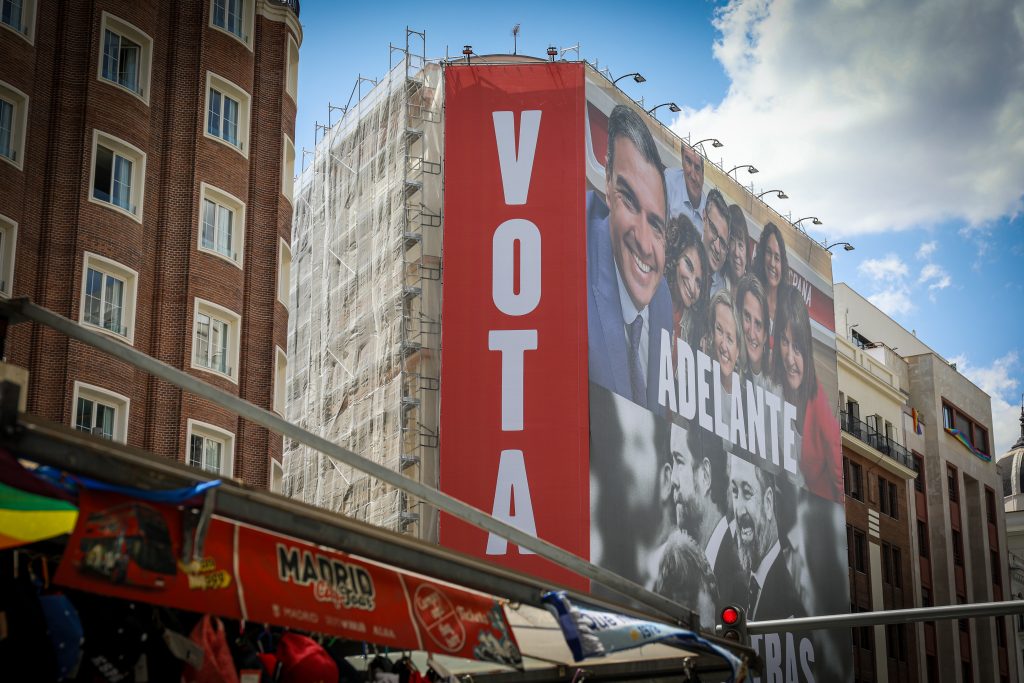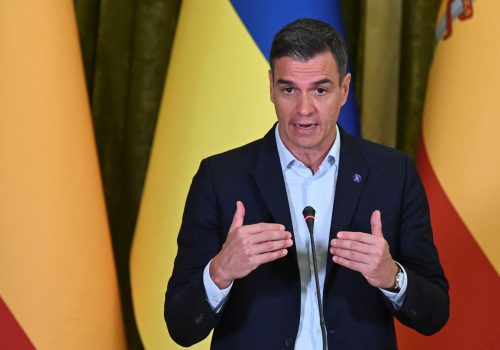This article was updated on July 25, 2023.
No party earned enough seats to form a majority in Spain’s snap elections on July 23. The election has only added to a period of political uncertainty as Spain takes the helm of its six-month presidency of the Council of the European Union (EU)—a role meant to coordinate EU legislation and deepen cooperation between member states.
With all eyes on Spain, the Europe Center is answering the big questions about the vote and providing a breakdown of the parties and issues to know.
Post-election expert analysis: Voters signal a return to centrism, but Spain is left in limbo
“Spain is still reeling from the poll-defying results of Sunday’s national parliamentary elections, which present a very complex panorama: the meager victory by the conservative People’s Party (PP), and the possibility of a coalition government led by the incumbent Pedro Sánchez’s Spanish Socialist Workers’ Party (PSOE).
“A popular adage in Spain has it that, more often than not, elections are lost, rather than won. According to these results, the loser would be far-right Vox (which lost nineteen seats), along with the Catalan secessionist parties (the Republican Left of Catalonia, or ERC, lost six and Together for Catalonia, or Junts, lost one), signaling an electorate looking to return to more centrist policies—and politicians.
“The PP’s weaker-than-expected showing (and, conversely, the PSOE’s stronger-than-expected performance) has left both parties with an unclear path to the 176 seats needed to secure the absolute majority. The possibility of a blockade preventing the most-voted party from forming a government (as it historically has done) cannot be ruled out, nor can the prospect of repeat elections.
“The state of limbo in which Spain finds itself has clear implications for its international commitments (the Euro-Latin American Parliamentary Assembly is currently meeting in Madrid). Key among these is Spain’s presidency of the Council of the EU. The uncertainty of the national panorama may very well make Spain’s international projection yet another loser in these elections.”
—Ana Palacio is a former minister of foreign affairs of Spain and a member of the Atlantic Council board of directors.
Breaking down the Congress of Deputies
* The modern Together for Catalonia split from a party with the same name in 2020 and continued to use the original branding. The data listed here is for the 2019 version of the party.
Congress of Deputies representation from 2008 to present
Pre-election analysis
What triggered these snap elections?
While Spain was due to hold national elections in December 2023, Sánchez rescheduled the vote following his governing coalition’s poor showing at local and regional polls across the country. The conservative PP picked up over 750,000 more votes than Sánchez’s PSOE, which joined with the far-left Unidas Podemos (Podemos) party in 2019 to form the first coalition government since 1982.
Some familiar factors such as increasing immigration, an aging population, and growing economic disparities are behind the rightward swing in Spanish domestic politics. But satisfaction with the current coalition is also declining in the face of high-profile feuds between the governing partners, the coalition’s perceived reliance on Catalan and Basque pro-independence constituencies, and unpopular social reforms. A sexual consent law spearheaded by Equality Minister Irene Montero (Podemos), for instance, revised the sentencing range for convicted sex offenders and led to the release of around one thousand offenders.
How does the election work?
In this election cycle, all 350 seats in the Congress of Deputies and 208 of 265 seats in the Senate are up for grabs, with a majority threshold of 176 seats in the Congress of Deputies needed to form a government. Elections for the lower house employ a closed-list system of proportional representation, whereas for the Senate, individuals may vote for three senators of any party. Representatives of both houses will serve four year terms—unless the future prime minister (also referred to as “president of the government”) chooses to dissolve either chamber again.
The date of the election itself poses a challenge. An estimated ten million Spaniards—of the thirty-seven million voters—are on summer holidays, so a record number of voters are expected to cast their ballots by mail, risking delays in counting votes and therefore forming a new government.
Regardless, it will still take some time to form a new government. Spain’s parliament will be out of session until August 17, and an investiture procedure involving King Felipe VI of Spain, meetings between partners, and several votes in the assembly must be completed. This procedure has proved challenging in the past: Sánchez first came to power after two investiture rounds, nine months after the first round of voting.
How does the election impact Spain’s presidency of the Council of the European Union?
As the holder of the Council presidency since July 1, Spain is responsible for chairing meetings of member state representatives and advancing the EU’s legislative initiatives. While the presidency is officially non-political, each presidency brings its own national priorities, and national politics inevitably bleed into the debate. The election and any potential change of government, therefore, will carry effects from Madrid to Brussels and beyond even if EU policy itself is not on the ballot.
Spain’s election comes at a critical time for policymaking in Brussels. Spain holds the last full presidency before EU parliamentary elections kick off next year, and Madrid is responsible for advancing hundreds of pieces of legislation currently under discussion, including on issues like the EU’s green transition, new industrial policy priorities, and continued support for Ukraine. In the face of this urgency, Sánchez has emphasized “the responsibility that lies in [Spain’s] hands is immense. Europe faces major challenges at home and abroad. And to rise to them, inaction is not an option.”
Yet Spanish ministers will be hard-pressed to successfully move forward with Europe’s legislative initiatives as they focus on their domestic campaigns. Sánchez and his ministers have already canceled various EU-related trips, and even postponed Sánchez’s appearance before the European Parliament in Strasbourg, where he was to present his program for the presidency. In addition to Sánchez, fourteen of seventeen Spanish ministers are juggling re-election and their roles in the Council presidency. The EU presidency has already been the focus of spats in Spain’s election campaign and domestic politics between Sánchez and opposition leader Feijóo.
Finally, if a new conservative government forms, it will take time for policymakers to adjust to their roles coordinating EU policymaking in line with their political vision. If neither party receives enough votes nor can form a majority coalition, there will need to be another election, risking further delays in establishing firm Spanish leadership in the EU.
Read more from Atlantic Council experts
Who are the parties to watch?
Sánchez’s gamble to secure a popular mandate may not pay off. According to recent polling, PP is polling at 33 percent to PSOE’s 28 percent. The far-right, populist Vox party is poised to remain the third-largest party in the Congress of Deputies, although a likely coalition between PP and Vox would still not reach the required threshold of 176 seats given current polling. On the left, Podemos has chosen to merge with the left-wing Sumar party, formed in April 2023 out of an alliance of a dozen left-leaning organizations. Led by Labor Minister Yolanda Diaz, the left-wing coalition is currently predicted to win 30 to 32 seats.
Top-polling parties
Spanish Socialist Workers’ Party

Orientation: Center-left
Leader: Pedro Sánchez
History: The Spanish Socialist Workers’ party was founded in 1879, making it the oldest modern political party. Having held power for longer than any other modern democratic party in Spain, the social democrats are hoping to clinch another term after calling the snap election. PSOE has twenty representatives in the European Parliament as part of the Socialists and Democrats parliamentary group.
Top priorities: Fiscal responsibility, social justice, and cost of living.
People’s Party

Orientation: Center-right
Leader: Alberto Núñez Feijóo
History: A 1989 re-foundation of former Franco minister Manuel Fraga’s conservative People’s Alliance party, PP is a conservative, Christian-democratic party. It is PSOE’s main rival and has led the national government twice: first from 1996 to 2004, and then from 2011 to 2018. In the European Parliament, PP is a member of the European People’s Party and currently holds 16 seats in the hemicycle.
Top priorities: Sustainable economic growth, infrastructure investment, and judicial independence.
Vox

Orientation: Far-right
Leader: Santiago Abascal
History: Vox is a populist, right-wing party and the result of a split from the PP nearly a decade ago. Vox entered Spain’s legislature in 2019, becoming the third largest party in the legislature with 52 seats.
Top priorities: Economic deregulation, privatization, and liberalization.
Sumar

Orientation: Left
Leader: Yolanda Díaz
History: Sumar was formed in April 2023 out of a coalition of over a dozen small, left-leaning political parties. As of early June, Sumar has been joined by Podemos, a grassroots, leftist-populist party founded by academics in 2014 and led by Ione Belarra.
Top Priorities: Climate policy and labor rights.
Together for Catalonia

Orientation: Big-tent
Leader: Laura Borràs
History: Together for Catalonia, or “Junts,” was established in July 2020 by former Catalan President Carles Puigdemont as a merger of seven parties.
Top Priorities: Catalan independence.
Republican Left of Catalonia – Sovereigntists

Orientation: Center-left to left
Leader: Oriol Junqueras
History: It formed in the April 2019 general election through an electoral coalition of two parties.
Top Priorities: Catalan independence.
What domestic priorities are driving people to the polls?
Economy
The Sánchez government has pumped billions of euros into the economy to shield the population from rising costs while placing windfall taxes on energy corporations and banks to offset rising costs. As part of these policies, a record number of jobs were created. Simultaneously, Spain received more than 50 percent of its 69.6 billion euro grants from the EU’s pandemic-era recovery fund. This has resulted in Spain having some of Europe’s lowest inflation and energy prices. Despite these efforts, a recent Eurobarometer survey found that 77 percent of Spaniards view Spain’s economic situation as bad, compared to a 63 percent average across all EU respondents.
Migration
Successfully concluding the European Migration and Asylum Pact is a cornerstone of Spain’s EU presidency priorities and remains a pivotal domestic priority. In the first half of 2023, over nine hundred migrants have died trying to reach Spain according to the non-profit Walking Borders. In 2022, Spain received 118,842 asylum requests, the highest in its history and third highest across the EU. Yet Spain awarded protection to less than 17 percent of applicants, far fewer than the EU average of 38.5 percent. One fifth of all irregular arrivals in 2022 across the EU arrived in Spain.
Climate
Spain is currently suffering from a historic drought, and the start of 2023 has been the driest year in the country since records were first kept. Feijóo and the PP are winning over support in rural regions with his efforts to address Spain’s water crisis, including promises of infrastructure investments in canals and reservoirs. The Spanish government previously estimated that half of Spain’s villages are at risk of being abandoned in the next few decades, due in part to the economic impacts of the changing climate.
Catalonian independence and Spanish nationalism
The fallout from Catalonia’s contested independence referendum in 2017 continues. Pro-separatist parties are largely out of power, and there’s little lingering appetite for independence among Catalonians: a Centre d’Estudis d’Opinió poll from July 2022 found support for secession had dropped to 40.9 percent. Instead, votes have gravitated towards pro-unionist, and even nationalist, political parties. Vox runs on a platform of “Espana: Una, Grande, y Libre,” emphasizing Spain’s unity, and its manifesto includes stricter penalties for “insulting the Flag, Crown or Anthem.”

The Europe Center promotes leadership, strategies, and analysis to ensure a strong, ambitious, and forward-looking transatlantic relationship.
Image: A canvas with propaganda installed by the Spanish socialist worker party PSOE in the Gran Via in Madrid. On July 7, the political campaign for the presidential elections on July 23 officially began in Spain. (Photo by David Canales / SOPA Images/Sipa USA)No Use Germany.

